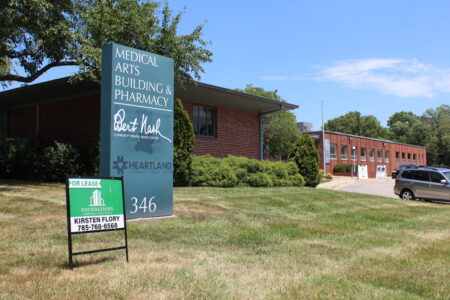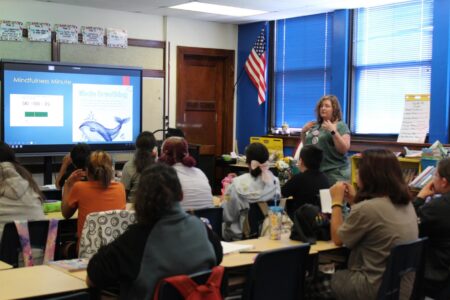Filling the gaps: New child care center to provide daytime, overnight and weekend care for infants, toddlers

photo by: Austin Hornbostel/Journal-World
The Community Children's Center's Early Childhood Community Center will eventually be located at 346 Maine St., currently the Medical Arts Building & Pharmacy.
Renovation has begun at the future home of the Community Children’s Center in Lawrence, which plans to offer much-needed daytime, overnight and weekend child care for infants and toddlers.
The project to renovate the building for the center, which will be located at 346 Maine St., began this past week with demolition work, according to Community Children’s Center Executive Director Kim Polson. The child care center is one component of a three-pronged model to support early childhood care in the community, and the renovation will result in the creation of seven classrooms that will serve 70 children during the day and another 70 children during overnight and weekend hours, for a total of 140 children.
Polson said the format of the center seeks to fill gaps in the community.
“Our goal overall as an organization is to identify system gaps in early childhood and then identify programs to fill those gaps,” Polson said. “And the child care facility portion of our project is doing that in two ways.”
Both the operating hours and the age group that will be served speak to that goal. Polson said parents who work in manufacturing, the service industry, hospitals and other essential roles such as law enforcement need day care in the evening, overnight and weekend hours. She said right now there is only one licensed facility in Douglas County that provides overnight hours, and that is a barrier for parents and the community at large.
“We know that that is a significant need in order for families, parents, caregivers to be able to continue to work,” Polson said. “That is another significant need in our community that we feel we can develop some strategies to fill that gap.”
She said the center is focusing on the spots for infants and toddlers, specifically those from birth to 24 months, because that age group represents the greatest need in the community. She said those spots are less common because care for that age group is the most expensive for providers. She said for every one infant/toddler spot in the community, there are up to 10 children who could fill that spot. However, she said the classrooms will be constructed so that the center will be able to serve children up to age five if the community’s needs change.
The center will also use a model to make sure it is accessible to different sectors of the population who need the child care. Polson said one third of each classroom would be reserved for families who receive child care subsidies from the Kansas Department for Children and Families, one third for families whose employers provide some kind of child care subsidy for their employees, and one third for the community at large. Fees will be charged on a sliding scale, with lower-income families paying less.
“So we feel like in those ways we are really meeting three different needs in each classroom,” she said.
Polson said both the cost and quality of care are issues the center seeks to address. In Douglas County, the average full-time cost to send an infant between birth and 12 months to a child care center is $1,136 per month, according to point-in-time data for Douglas County from Childcare Aware of Kansas. For children 12 to 17 months, that cost decreases only slightly, to $1,021 per month. For children 18 to 23 months, the cost is $1,001 per month.
However, even in some of those child care centers, which are on average more expensive than care provided in home day cares, parents may find that their child’s teacher does not have a degree in early childhood education or a related field. That will not be the case with the Community Children’s Center.
Polson said lead teachers at the center will be certified teachers who have gone through an education program and have a bachelor’s degree, and that the plan is to pay those teachers similarly to a teacher entering into the local school district. Teacher aides will be paid a minimum of $15 per hour. She said the pay reflects the fact that education at age 2 or 3 is of no less value than education at older ages.
“Really what we’re trying to do is make sure that early childhood professionals are compensated in a way that is similar in structure to local public schools, as well as acknowledging the fact that the most brain development happens in the first five years of life,” Polson said. “And so the investment in that part of life is crucial and can have a significant impact on the quality of life for the long haul.”
All of the efforts with the child care component of the center are part of the larger, systemwide focus of the organization. As the Journal-World has previously reported, the center will provide other services for families and be involved in efforts to strengthen the community’s child care system as a whole. That includes a support network for early childhood professionals and a family resource center for parents and guardians who need assistance navigating social services. Other resources available at the center will include an indoor playground space and a free community store for distributing early-childhood and maternity items.
The format used in the child care aspect of the center ties into those larger goals and the center’s systemic approach to child care. For instance, Polson said while the child care center will reserve a third of its spaces for families who use subsidies from the Department for Children and Families, the organization will also be sharing information with other child care providers to encourage more to accept the subsidies. She said reserving a third of the spaces for families who receive support from their employer for child care is also part of a larger effort to encourage those programs in the community.
“We need people to understand this is not an issue only for families with young children,” Polson said. “It’s an issue for our community, and for our economy and quality of life within our community.”
The center has received various forms of support from the state of Kansas, Douglas County, and the City of Lawrence, and it hopes to be a model for additional centers, according to its application for economic incentives from the City of Lawrence. The application states that with the support of the Lawrence Chamber, the center has already engaged in discussions related to the creation of similar child care facilities in strategic areas of the community, such as East Hills Business Park and the Packer Road manufacturing corridor. The application states the project will prove the concept so it can be replicated and tweaked for other areas of the community.
“We are trying to create the highest quality child care environment to serve as a model for our community,” Polson said.
Polson said the goal is to have the renovation complete by early 2024, after which the center will begin opening classrooms as they are filled.







